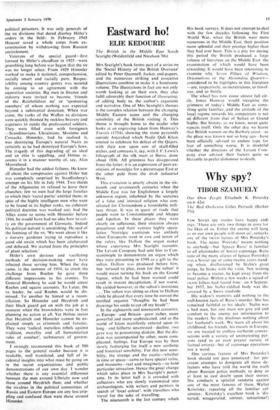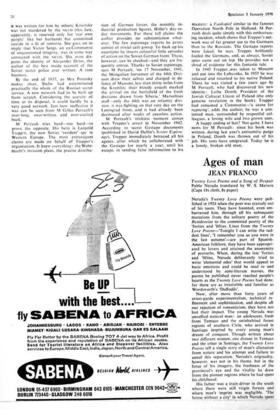Why spy?
TIBOR SZAMUELY
Our Own People Elisabeth K. Poretsky touP 42s) The Red Orchestra Gilles Perrault (Barker 55s) Few Soviet spy stories have happy end- ings. '1 here are only two things in store for the likes of us. Either the enemy will hang us or our own people will shoot us', remarks one of the NKVD heroes of Mrs Poretsky's hook. The name 'Poretsky' means nothing to anybody—but 'Ignace Reiss' is familiar to all aficionados of Soviet espionage. Reiss (one of the many aliases of Ignace Poretsky) was a Soviet spy of some twenty years stand- ing when, disillusioned by Stalin's great purge, he broke with the USSR. Not wishing to become a traitor, he kept away from the local police. Within a few weeks a squad of NKVD killers had found him: on 4 Septem- ber 1937, his bullet-riddled body was dis- covered by a Swiss roadside.
His widow's memoirs add nothing to the well-known facts of Reiss's murder. She has remained faithful to his ideals: Stalin was a bad man, but one must not give aid and comfort to the enemy (or information to the reader). So she discloses nothing about her husband's work. We learn all about his childhood, his friends, his travels in Europe; we are treated to endless verbatim conver- sations with a variety of uninteresting per- sons (and to an even greater variety of factual errors)—but of espionage operations not a word.
One curious feature of Mrs Poretsky's book should not pass unnoticed: her per- sistent attempts to denigrate all those de- fectors who have told the world the truth about Russian police methods, to deny or at least to cast doubt upon their stories. She conducts a spiteful vendetta against one of the most famous of these. Walter Krivitsky, repeating all the familiar cal- umnies: Krivitsky's excellent book is 'dis- torted, exaggerated, sinister, sensational';
it was written for him by others; Krivitsky was not murdered by the NKVD (this fate, apparently, is reserved only for 'our own people' like her husband) but committed suicide in a fit of remorse. She goes on to imply that Victor Serge, an ex-Communist of unquestioned integrity, was in some way connected with the NKVD. She even dis- putes the identity of Alexander Orlov, the author of the best inside account of the Soviet secret police ever written. A rum business.
By the end of 1937, as Mrs Poretsky makes clear, Stalin had exterminated practically the whole of the Russian secret service. A new network had to be built up from scratch. Considering the scarcity of time at its disposal, it could hardly be a very good network. Just how ineffective it was can be seen from M Gilles Perrault's over-long, over-written and over-excited book.
M Perrault tries hard—too hard—ki prove the opposite. His hero is Leopold Trepper, the new Soviet 'resident' spy in Western Europe. The most extravagant claims are made on behalf of Trepper's organisation. It knew everything: the Wehr- macht's invasion plans, the precise distribu- tion of German forces, the monthly in- dustrial production figures, Hitler's day-to- day movements. For these tall claims the author provides no substantiation what- ever. The few espionage reports he prints consist of trivial café gossip. To back up his assertions he inserts colourful little episodes of action on the Soviet-Gel-man front. These, however, can be checked—and they are fre- quently untrue. Thanks to Soviet espionage, says M Perrault, 'on 17 November, 1941, the Mongolian horsemen of the 44th Divi- sion drew their sabres and charged in de- fence of Mussino, less than thirty miles from the Kremlin; their bloody assault marked the arrival on the battlefield of the fresh divisions drawn from Siberia.' Marvellous stuff—only the 44th was an infantry divi- sion, it was fighting on that very day on the Leningrad front, and it had already been decimated after weeks of ceaseless action.
M Perrault's trickiest moment comes with Trepper's arrest in November 1942. According to secret Gestapo documents (published in David Dallin's Soviet Espion- age), Trepper immediately betrayed all his agents, after which he collaborated with – the Gestapo for nearly a year, until his escape, in sending false information to his masters: a Funkspiel similar to the famous Operation North Pole in Holland. M Per- rault deals quite simply with this embarrass- ing incident, which shows that Trepper's net- work was of far greater use to the Germans than to the Russians. The Gestapo reports were faked, he says. Trepper brilliantly fooled the Germans, and, as always, Soviet spies came out on top. He provides not a shred of evidence for this fantastic tale.
In 1945 Trepper _was taken to Moscow and put into the Lubyanka. In 1955 he was released and returned to his native Poland. There he was visited a few years ago by M Perrault, who had discovered his new identity: Leiba Domb, President of the Jewish Cultural Union of Poland (the only genuine revelation in the book). Trepper had remained a Communist—`a cause for rejoicing', adds the author; he was a con- tented man, surrounded by respectful col- leagues, a loving wife and two grown sons.
A happy ending at last? Not quite. I have news for M Perrault: since his book was written, during last year's antisemitic purge in Poland, Domb was thrown out of his job. His sons have emigrated. Today he is a lonely, broken old man.















































 Previous page
Previous page